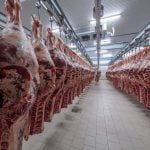
Tag Archives Canadian Meat Council

Pork industry acting quickly on ractopamine finding in China

AMR challenge results in new strategy
Weakening bacterial diseases would give animals and humans the opportunity to defeat them on their own

Meat industry excited about Ukraine trade deal
The deal will eliminate most tariffs for goods moving between the two countries

Health Canada edging closer to action on antimicrobial resistance
Use of these products in livestock is likely to be sharply curtailed to protect products important to human health

Action finally in sight on CFIA modernization
Changes were first promised more than five years ago but were derailed by a federal election

NFU opposes ground beef irradiation
Irradiation will allow large companies to benefit from regulation and puts up another barrier to smaller packers, the NFU says

Temporary foreign worker program gets reprieve
Employers who have been in the program the longest are being exempted from further reductions in the proportion of their workforce that aren’t citizens
Meat, fruit and vegetable processors are welcoming a recent announcement that reductions in the temporary foreign workers programs have been frozen for now. Employment Minister MaryAnn Mihychuk recently said employers registered in the Temporary Foreign Worker Programs (TFWP) prior to June 2014 will be able to continue to use up to 20 per cent non-citizens
Taiwan again accepting Canadian UTM beef

VIDEO: Pigs won’t fly — at least not to Europe
Glacier FarmMedia Special Report: The tariff-free quota access could be worth $400 million, but there are other complications

Agricultural labour shortage will worsen, new report says
Cash receipt losses to Canadian farmers from job vacancies pegged at $1.5 billion, or three per cent of the industry’s total value in sales and production


